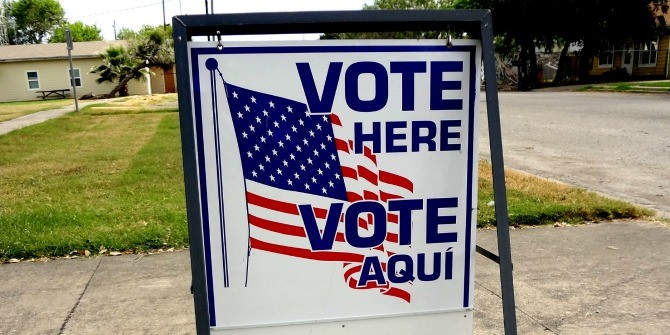 Tomorrow voters in Wisconsin go to the polls in the Badger State’s presidential primary. LSE US Centre Director, Peter Trubowitz writes that according to recent polls, both respective frontrunners for the Republican and Democratic parties, Donald Trump and Hillary Clinton, are set to lose the Wisconsin primary. While Clinton is still likely to win the Democratic nomination even if she does lose this week, a second place finish for Donald Trump – whose campaign now seems to be in disarray – means that a contested Republican convention in July would be much more likely.
Tomorrow voters in Wisconsin go to the polls in the Badger State’s presidential primary. LSE US Centre Director, Peter Trubowitz writes that according to recent polls, both respective frontrunners for the Republican and Democratic parties, Donald Trump and Hillary Clinton, are set to lose the Wisconsin primary. While Clinton is still likely to win the Democratic nomination even if she does lose this week, a second place finish for Donald Trump – whose campaign now seems to be in disarray – means that a contested Republican convention in July would be much more likely.
Frontrunners Donald Trump and Hillary Clinton are coming off tough weeks. Trump has been doing everything he can to snatch defeat from the jaws of victory. His comments and tweets about abortion, nuclear weapons, NATO, and his closest competitor’s wife, Heidi Cruz, have once again raised doubts about his temperament, judgment, and decency. No wonder that the odds of a contested Republican convention have shot up in the past few days.
If Trump loses in Wisconsin, it will be harder (though not impossible) for him to secure the 1237 delegates he needs to win on a first ballot at the convention. Of course, the chances that Ted Cruz can make up the difference in delegates are low. His brand of conservatism will not play well in most of the Republican primaries to come. Indeed, much of the ‘Republican establishment’ support you see for Cruz right now is strategic: it’s aimed at stopping Trump, not helping Cruz win the nomination.
So where does that leave Republicans? The short answer is John Kasich, who is currently running a distant third right now. Kasich’s only chance to win the nomination is in fact a contested convention. But even that would require a change in the rules by the convention nominating committee — something the Trump and Cruz campaigns are both trying to prevent. Off the three Republicans though, Kasich is the one best positioned to beat Clinton in a general election. In one-on-one match-ups, Kasich defeats her in most national polls.
Meanwhile, on the Democratic side Clinton can’t seem to put Bernie Sanders away. Sanders has now won the last 5 showdowns with Clinton (Idaho, Utah, Alaska, Hawaii, and Washington) and polls show him poised to narrowly win Wisconsin tomorrow — a state where she led Sanders by 50 points a year ago. Even in New York, Clinton’s adopted home state, the race is tightening. The latest poll there shows Sanders cutting Clinton’s 20 point lead in half. New Yorkers vote on April 19.
To be sure, Clinton still holds a commanding lead over Sanders in the delegate count. A defeat in Wisconsin tomorrow won’t change that. However, a loss in New York — a state that any Democrat must have to win the general election — would raise troubling questions about her viability in the November contest Yet even if Clinton does win New York as expected, she has her work cut out. She will need to win over Sanders’s diehard supporters, many of whom do not trust her. Which may explain why Elizabeth Warren’s name kept popping up us last week.
Warren is the popular progressive Senator from Massachusetts. Her endorsement would help Clinton patch things up with Sanders voters. Winning Warren’s backing is going to take more than vague party platform promises though. Warren will likely press Clinton to provide the names of people she hopes to fill the key economic positions (e.g., Secretary of the Treasury) in any Clinton administration. As Warren is fond of saying, ‘personnel is policy.’
Tomorrow will mark the end one topsy-turvy week and if the polls in Wisconsin are right, the beginning of another.
Featured image credit: DonkeyHotey (Flickr, CC-BY-SA-2.0)
Please read our comments policy before commenting.
Note: This article gives the views of the author, and not the position of USAPP – American Politics and Policy, nor the London School of Economics.
Shortened URL for this post: http://bit.ly/1UPIcpW
_________________________________
About the author
 Peter Trubowitz – LSE US Centre
Peter Trubowitz – LSE US Centre
Peter Trubowitz is Professor of International Relations, and Director of the LSE’s US Centre. His main research interests are in the fields of international security and comparative foreign policy, with special focus on American grand strategy and foreign policy. He also writes and comments frequently on U.S. party politics and elections and how they shape and are shaped by America’s changing place in the world.






